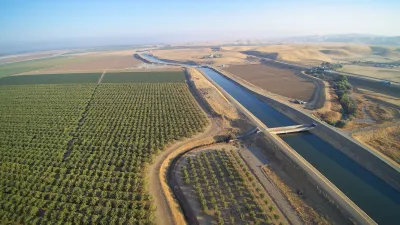While the federal government has dithered on comprehensive programs to limit greenhouse gas emissions, states and cities have led such efforts. Climate change skeptics are now leading efforts to reverse state renewable energy mandates across the US.
Juliet Eilperin reports on efforts by the Heartland Institute, a libertarian think tank, and the conservative American Legislative Exchange Council (ALEC), to "repeal state standards requiring utilities to get a portion of their electricity from renewable power." With funding from sources such as Exxon Mobil and foundations affiliated with Charles G. Koch and David H. Koch, the groups have worked together to draft model legislation dubbed the Electricity Freedom Act [PDF], aimed at reversing renewable energy mandates in some of the twenty-nine states (and the District of Columbia) that have such standards.
"James Taylor, the Heartland Institute’s senior fellow for environmental policy, said he was able to persuade most of ALEC’s state legislators and corporate members to push for a repeal of laws requiring more solar and wind power use on the basis of economics," notes Eilperin. “Renewable power mandates are very costly to consumers throughout the 50 states, and we feel it is important that consumers have access to affordable electricity,” Taylor said. “We wrote the model legislation and I presented it. I didn’t have to give that much of a case for it.”
"But Gabe Elsner, co-director of the public watchdog group Checks and Balances Project, said the legislation and economic reports [produced by groups receiving funding from the Koch brothers] amount to 'a one-two punch against clean energy laws across the country' by fossil-fuel interests," says Eilperin.
“You push the legislation to state legislators and then you fund reports to support the argument and convince state lawmakers,” Elsner said, “and all without any transparency or disclosure about the sources of this funding.”
FULL STORY: Climate skeptic group works to reverse renewable energy mandates

Alabama: Trump Terminates Settlements for Black Communities Harmed By Raw Sewage
Trump deemed the landmark civil rights agreement “illegal DEI and environmental justice policy.”

Study: Maui’s Plan to Convert Vacation Rentals to Long-Term Housing Could Cause Nearly $1 Billion Economic Loss
The plan would reduce visitor accommodation by 25% resulting in 1,900 jobs lost.

Planetizen Federal Action Tracker
A weekly monitor of how Trump’s orders and actions are impacting planners and planning in America.

This Toronto Suburb Has More Bus Riders Than Columbus, Ohio
Brampton, Ontario used gradual improvements in service to prove that if you build it, they will ride.

Paris Bike Boom Leads to Steep Drop in Air Pollution
The French city’s air quality has improved dramatically in the past 20 years, coinciding with a growth in cycling.

Why Housing Costs More to Build in California Than in Texas
Hard costs like labor and materials combined with ‘soft’ costs such as permitting make building in the San Francisco Bay Area almost three times as costly as in Texas cities.
Urban Design for Planners 1: Software Tools
This six-course series explores essential urban design concepts using open source software and equips planners with the tools they need to participate fully in the urban design process.
Planning for Universal Design
Learn the tools for implementing Universal Design in planning regulations.
Smith Gee Studio
Alamo Area Metropolitan Planning Organization
City of Santa Clarita
Institute for Housing and Urban Development Studies (IHS)
City of Grandview
Harvard GSD Executive Education
Toledo-Lucas County Plan Commissions
Salt Lake City
NYU Wagner Graduate School of Public Service





























